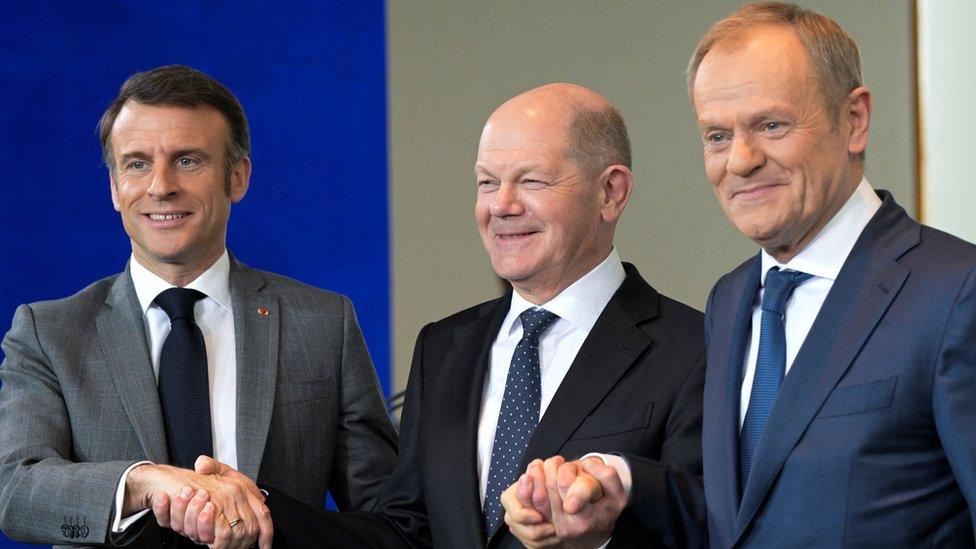Republican Speaker Johnson makes fresh push for Ukraine aid
- Published

Republican Speaker of the House Mike Johnson has a plan for getting new military assistance for Ukraine approved by Congress - and for keeping his tenuous hold on power.
With Democrats wary and a Republican right flank eyeing open rebellion, however, Mr Johnson may find that even the best-laid plans could quickly unravel.
The Louisiana congressman told Fox News he would push the House - which has the narrowest of Republican majorities - to structure new Ukraine support in the form of loans.
To help cover the costs he suggested authorising the US government to seize and sell Russian assets frozen since the start of the Ukraine war.
"If we can use the seized assets of Russian oligarchs to allow the Ukrainians to fight them, that's just pure poetry," said Mr Johnson.
An estimated $300bn (£239bn) in Russian central bank assets have been frozen - although most of this is under European, not American, control.
As an additional sweetener for his Republican colleagues, he also proposed tying the passage of Ukraine aid to legislation ending a hold on new liquefied natural gas export authorisations. The hold was imposed by the Biden administration in January at the behest of environmental activists.
This wouldn't be the first time Republicans have tried to tie Ukraine assistance - which is opposed by a growing number of conservative voters and a small but vocal group of legislators - to an unrelated political priority for the party. In February, Senate Republicans negotiated with Democrats to construct a legislative package that included funding for Ukraine along with conservative immigration reforms and resources for border security.
The deal collapsed, however, after Republican presidential candidate Donald Trump voiced his opposition and his supporters in Congress - including Mr Johnson in the House - followed suit.
The White House says approved Ukraine aid ran out at the beginning of the year and has repeatedly warned that the nation is losing ground in its war against Russia because of a lack of continued American backing.
In the House of Representatives, pro-aid legislators have been gathering signatures for a parliamentary procedure that would trigger a vote on a Senate-approved measure that authorises new aid for Ukraine and Israel - essentially forcing Mr Johnson's hand.
The House speaker's latest proposal may be a way to forestall such a direct erosion of his power to set the legislative agenda.
As Mr Johnson grapples with how to help Ukraine, however, he stands on unstable ground. The man who assumed the speakership after his predecessor was ousted last year by a right-wing rebellion is facing similar unrest from his party's hard-core right.
His negotiated deal with Democrats to avoid a government shutdown two weeks ago prompted one conservative firebrand, Georgia Congresswoman Marjorie Taylor Greene, to file a motion for his removal. While she has not taken steps to force a vote on the matter, she has warned that she will if Mr Johnson isn't ultimately replaced.

The White Hose has repeatedly warned that Ukraine is losing ground in its war against Russia due to a shortfall in US support
Later this month, Republican membership in the House will drop to 217 - meaning it would only take two Republicans to join the chamber's 213 Democrats to launch an attempt to oust Mr Johnson.
On Sunday night, Mr Johnson tried to reset expectations for his party - and buy himself some breathing room.
"We have the smallest majority, literally, right now in US history," he said. "So we're not going to get the legislation that we all desire and prefer."
This mathematical reality puts the speaker in a delicate situation. If he angers even a handful of Republicans, such as by striking a deal to help Ukraine, it may trigger an uprising. And if he doesn't do enough to placate Democrats, they may once again help the rebellious conservatives execute their plot.
With national elections to decide the presidency and control of both chambers of Congress set for November, Mr Johnson - and his fellow Republicans - can ill afford to appear rife with internal divisions and incapable of governing.
"This is not an easy job right now," Mr Johnson said.
- Published29 March 2024

- Published22 March 2024

- Published24 March 2024

- Published15 March 2024

- Published2 April 2024
